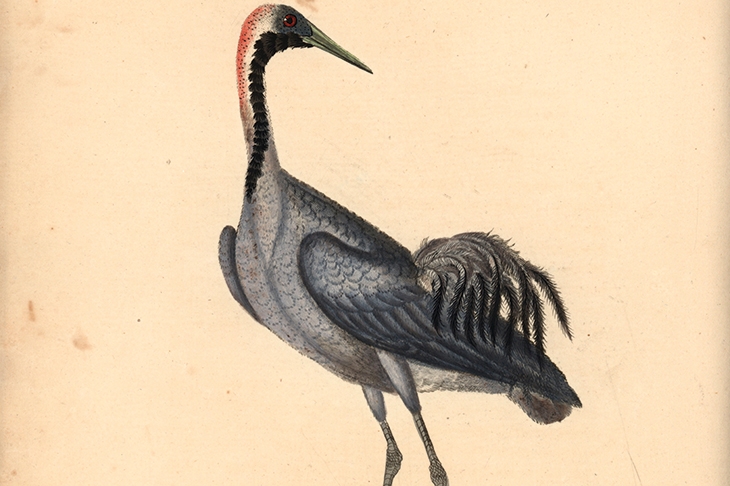The RSPB regularly gets calls from people who have seen ‘a funny bird’. ‘It’s got a red head and it’s feeding from the bird table.’ ‘That sounds like a goldfinch.’ ‘No, no — it’s standing on the ground and feeding from the bird table…’
Cranes can stand as tall as a man. They became extinct as breeding birds in this country and stayed that way for damn near half a millennium. But astonishingly they’ve come back, and of their own accord. The first pair simply turned up at Horsey Mere in Norfolk, on the north-eastern edge of the Broads, a few decades ago; in 2010, nine pairs produced six young, and now, with an optimism rare in wildlife conservation — and after a successful reintroduction programme on the Somerset Levels — a complex form of population modelling predicts that there will be 275 pairs of breeding cranes in the country in 50 years’ time.
I’ve seen four of them flying over my place in Norfolk: spiralling down and flirting with the idea of landing before changing their minds and rising again with laborious strokes of their great wings, long neck stuck out in front and longer legs trailing behind.
Cranes were once part of the British landscape. Their ancient presence can be traced in place names: Cranworth, Cransford, Tranmere (Modern Swedish ‘trana’ means crane) and many others. There are fossilised crane footprints on the foreshore of the Severn estuary which date back 8,000 years. The Chinese call them the birds of heaven; they’re talking about a different species of crane, but there’s something otherworldly, angelic even, about all of them. Cranes dance, in courtship and other times of excitement, making elaborate gestures with their wings while they bounce on impossible legs, as if the earth were constantly trying and failing to hold on to them.
They have extraordinarily long, looping windpipes which allow them to make bugling sounds that can carry for three miles; Homer compared their sound to that of an invading army. They seem to belong to another age of human possibilities. But they took part in too many medieval banquets and were probably all gone by 1600. By the 20th century, we had quite forgotten that cranes were once as much British birds as robins and wood pigeons.
Why have the cranes come back? Likely habitat: that’s what it’s all about. They found the place suited them — and glory be, they stayed. These were migrating birds, travelling between Scandinavia and southern Europe. They saw a pleasing spot and thought: well, why not stop for a break? Horsey Estate, now owned by the National Trust, and the nearby Hickling Broad, a reserve run by Norfolk Wildlife Trust, are beautifully managed places. In the past half-century there have been many projects all over the country to restore and create wetlands: ancestral atavistic landscapes that are equally good for birds and for human souls. The cranes liked it so much they didn’t even trouble to migrate.
In 1995 the RSPB bought a vast carrot field in the Fens, and turned it back into a real fen. The wildly ambitious project of creating Lakenheath Fen opened new possibilities in the way we manage land: but even in the headiest days of this project, no one expected cranes to drop by and start breeding. Yet that’s exactly what happened.
Wetland restoration has continued on a larger scale in the Somerset Levels, the site of the Great Crane Project. This involved collecting the eggs of wild cranes in Germany, incubating them and hand-rearing the chicks to adulthood. Between 2010 and 2015, 93 cranes were released on the Levels. Last year four chicks were fledged: slow-going, but these are long-lived birds — they can reach 30 — and a pair will raise one or at most two chicks in a year. There are also cranes breeding in Yorkshire and north-east Scotland.
At bottom, all of this is about the two most important concepts in wildlife conservation: landscape-scale projects and connectivity. In truth, these are two ways of saying the same thing: that the more wild places can be managed and created and joined up together, the richer our countryside will be. An area of gorgeous habitat is good: but it’s much more effective if it’s joined up to other such places. This is not at the expense of agriculture: rather, it’s about agriculture with a shifting view of priorities, in which food production is not the sole good.
The Great Fen Project now has 2,140 acres that are being restored from intensive farming, along with 3,350 acres already managed for wildlife: what was once the bleakest view in rural Britain is now teeming with life — and cash-bearing visitors. Humans are drawn to the wild landscapes just as the cranes are.
I took an electric boat for a near-silent potter around Hickling Broad and beyond. Just a few yards from the whispering craft three cranes got up and flew low over the reeds: both monstrous and beautiful, birds of our long-lost past, birds of our uncertain present, and birds of our even more uncertain future. For a moment it was possible to forget life’s troubles: cranes are in their heaven, all’s right with the world.






Comments